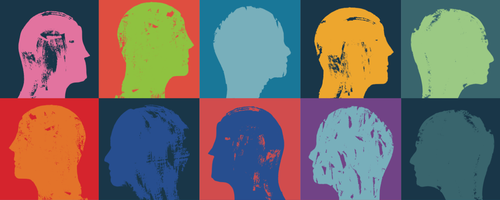
PRISMH: The President's Initiative for Student Mental Health
The need to address and support student mental health is critically important in a time when mental health conditions among college students are at alarming levels and on the rise. PRISMH is part of MPact 2025, fulfilling our commitments to student success and community belonging while building upon campus and systemwide initiatives and efforts.
Learn more about MPact 2025
Seed Grant Outcomes
PRISMH and the Masonic Institute for the Developing Brain partnered to create a seed grant focused on investigating upstream causes, antecedents, and risk factors for mental health issues. Congratulations to the grant recipients:
-
Dr. Ka Ip, a faculty member in the Institute of Child Development, will investigate structural racism and its associations with adolescent mental health.
-
Dr. Katie Cullen of the Department of Psychiatry and Behavioral Sciences will study UMN college students who suffer from depression by way of an art-based intervention.
Mental Health Training
Mental Health training is a free professional development opportunity supported by PRISMH and designed for University of Minnesota faculty and staff. Participants will learn up-to-date information about UMN students on their campus and essential skills for supporting the needs of today’s students. The program is made up of eight, 20-minute long modules available through the Training Hub:
- Student mental health at UMN-TC – prerequisite module
- Making effective referrals
- Listening effectively to student mental health concerns
- Responding appropriately to student mental health concerns
- Situations of student suicidality
- The impact of identity and oppression on student mental health
- Beyond the individual: Promoting mental health for groups of students
- Taking action to promote student mental health: Applied project
This fully-asynchronous series of training allows participants to access the content proactively in full, or as their schedule allows in response to specific situations. Self-enroll at any time through the Training Hub.
Supporting Student Mental Health & Wellness microtraining videos
The quick “Supporting Student Mental Health & Wellness” series of microtraining videos is designed to help faculty and staff on all system campuses build their competence and confidence in supporting student mental health. A series of 10-12 short videos is being developed 2023-2025. The content is supported by the PRISMH services and treatment workgroup in partnership with the Office for Student Affairs, adapted from the Mental Health Advocates curriculum by a team of mental health, public health, and student affairs professionals. Stay tuned for more in the series.
Resources
The University of Minnesota provides a variety of mental health resources across its five campus system.
Crookston
Rochester



PRISMH Task Force Progress
Task Force Members
Task Force members
- Jake Christopher Atencio - SA Student Representative to Colleges Against Cancer; Student Advisor to the UMR Health and Wellness Committee; U of M Rochester Student
- Jean Baribeau-Thoenness - Counseling Director in Health Services, Duluth
- Tammy Berberi - Associate Professor, French, Morris
- Michelle Bettin - Interim Director, Student Counseling Services, Twin Cities
- Kate Elwell - Senior Health Promotion Specialist, Boynton Health, Twin Cities
- Veronica Gaidelis-Langer - Clinical Case Manager and Counselor, Duluth
- Kacey Gregerson - Undergraduate Academic Advisor, Department of Chemical Engineering & Materials Science, Twin Cities
- Tabitha Grier-Reed - PRISMH Co-Chair, Associate Dean for Graduate Education and Faculty Development, College of Education and Human Development, Twin Cities
- Beth Lingren Clark - Associate Vice Provost for Strategic Enrollment, Twin Cities
- Sophie Magro - Graduate Student, Twin Cities
- Boonmee McElroy - Mental Health Counselor & Coordinator of Counseling Services, Rochester
- Heather McGinnis - Assistant to the Vice President and Dean of Students, Office for Student Affairs, Twin Cities
- Chiara Mesia Doig - Clinical Social Worker, Boynton Mental Health Clinic, Twin Cities
- Cari Michaels - Extension Educator, Extension Center for Family Development, Twin Cities
- Houng Nguyen - Clinical Associate Professor, School of Nursing, Twin Cities
- Roun Said - Ph.D. Student, Twin Cities
- Paul Shepherd - System Director for Student Development and Success, Minnesota State System
- Erin Slattengren - Assistant to the Provost, Twin Cities
- Nadezhda Sotirova - Associate Professor, Morris
- Megan Sweet - Assistant to the President, Office of the President
- Kaitlyn Swinney - Doctoral Student, Kinesiology Department, Twin Cities
- Maggie Towle - PRISMH Co-Chair, Senior Associate Vice President for Student Affairs and Dean of Students, Twin Cities
- Lindsey Weiler - Associate Professor, Department of Family Social Science, Twin Cities
- Christie Wells - Internal Communications Director, University Relations, Twin Cities
- Jeanne Williamson - Assistant Director of Student Counseling, Health, and Wellness, Morris
- Flora Yang - Liberal Arts Student, Twin Cities
- Marco Yzer - Professor, Hubbard School of Journalism and Mass Communications, Twin Cities
Subject Matter Experts
Administration
- Lisa Erwin - Vice Chancellor of Student Life, Duluth
- Javier Gutierrez - Assistant Vice Chancellor for Student Success, Engagement, and Equity, Rochester
- Sandy Olson-Loy - Vice Chancellor of Student Affairs, Morris
- Calvin Phillips - Vice President of Student Affairs and Dean of Students,Twin Cities
Allyship and Early Detection Group
- Leif Anderson - CLA Undergraduate Student, Twin Cities
- Christine Danner - Assistant Professor, Medical School,Twin Cities
- Betsy Ferwerda - Assistant Librarian, Crookston
- Sara Johnson - Assistant Dean for Student and Resident Affairs, School of Dentistry, Twin Cities
- Fiyyaz Karim - Lecturer, College of Continuing and Professional Studies, Twin Cities
- Douglas Kennedy - Assistant Professor, School of Nursing, Earl E. Bakken Center for Spirituality & Healing’s Integrative Health & Wellbeing Research Program, Twin Cities
- Kely MacPhail - Learning Resources Group Director, Earl E. Bakken Center for Spirituality & Healing, Twin Cities
- Jordanna Midthun - Public Health Graduate Student, Twin Cities
- Sue Wick - Professor Emerita, College of Biological Sciences, Twin Cities
- Chenwei Yan - CLA Undergraduate Student, Twin Cities
Prevention and Upstream Group
- Ellen Adams - Assistant Professor, Medical School, Twin Cities
- Joan Blakey - Director, School of Social Work, Twin Cities
- Hodan Hachi - Public Health Graduate Student, Twin Cities
- Emma Hamlin - CLA Undergraduate Student, Twin Cities
- Sarah Hilger - Academic Advisor, College of Science and Engineering, Twin Cities
- John Romano - Emeritus Professor, College of Education and Human Development, Twin Cities
- Lisa Stephenson - RecWell Manager, Twin Cities
Research Group
- Heather Cornelius - CLA Graduate Student, Twin Cities
- Robert Dunbar - Associate Professor, Center for Learning Innovation, Rochester
- Emily Jordan Jensen - Lecturer, College of Continuing and Professional Studies, Twin Cities
- Angie Mejia - Assistant Professor and Civil Engagement Scholar, Center for Learning Innovation, Rochester
- Kaz Nelson - Associate Professor, Psychiatry and Behavioral Sciences, Medical School, Twin Cities
- Soumya Sen - Associate Professor, Carlson School of Management, Twin Cities
- Deb Wingert - Education Program Specialist, Center for Educational Innovation, Twin Cities
Services and Treatment Group
- Safa Ali - CLA Undergraduate Student, Twin Cities
- Stacy Crawford - Professional/Senior Advisor, College of Arts, Humanities, and Social Sciences, Duluth
- Matt Hanson - Acting Director, Boynton Mental Health Clinic, Twin Cities
- Michael Kim - Assistant Dean for Student Affairs, Medical School,Twin Cities
- Ayan Mohamed - Pharmacy Graduate Student, Twin Cities
- Coralie Pederson - Certified Nurse Practitioner, Boynton Health, Twin Cities
- Jodi Ramberg - Counselor and Counseling Services Director, Crookston
- Emily Schneider - Undergraduate Student, Crookston
- Scott Slattery - Director of Learner Development, Medical School, Twin Cities
- Jasmine Snow - CLA Undergraduate Student, Twin Cities
- Anna Stalsberg - CLA Undergraduate Student, Twin Cities
- Alexis Zanghi - CLA Graduate Student and TA, Twin Cities
Task Force Updates
2.2023
As the task force passes the halfway mark of PRISMH's three year charge, workgroups focused on services and delivery, faculty, and communications are outlining implementation plans for goals set in year one.
The task force has also endorsed the From Cultural Mismatch to Cultural Health Virtual Conference, announced Seed Grant Outcomes, and supported the Open Pathway Quality Initiative for the Higher Learning Commission through the development of The Transforming Learning Environments in Support of Student Mental Health Initiative.
9.2022
The task force endorsed the following resources to support student mental health:
-
Responding to Student Suicidality is a training developed for the Mental Health Advocates program, led by Student Counseling Services and Boynton Health, through a systemwide, interdisciplinary collaboration. This excellent course takes approximately 30-60 minutes to complete. It is designed to equip faculty and staff with the knowledge and skills to respond to and support a student experiencing suicidality. It also highlights the University’s mental health resources on each campus.
-
You@UMN is a free, personalized, well-being portal for students. It connects them to 1) online tools such as tips to manage anxiety and stress and 2) campus resources to promote their academic success and career preparedness, help them thrive physically and mentally, and build their sense of purpose and connection to our campuses.
-
Making Effective Referrals is a pilot video that is the first in a series to be developed during AY22-23 aimed at helping faculty and staff build their competence and confidence in supporting student mental health.
1.2022 The task force established the following working groups for spring semester who will come together over the month of February to establish their work plans, and will report monthly at the March, April, and May PRISMH task force meetings. Task force meetings will provide opportunities for cross-fertilization with respect to communications strategy, faculty work, research, and service delivery.
- Communications Work Group, Co-Chairs Soumya Sen & Savala DeVoge
- Faculty Work Group, Co-Chairs Sue Wick & Erin Keyes
- Research Work Group, Co-Chairs Roun Said and Kaitlyn Swinney
- Service Delivery Work Group - tentative; Co-Chairs Sarah Hilger & Maggie Towle
12.2021 Task force members and subject matter experts met monthly during fall semester with meetings focused on understanding resources across the UofM system including new initiatives. Topics covered included the following:
- Environmental scan presentation by Vesna Hampel-Kozar and Matt Hanson
- SERU data presented by Daniel Jones-White and Steven Hawks
- Consultation on Provost Disability Task Force Recommendations regarding Accommodated Instruction with Tammy Berberi
- You@UMN Presentation/Discussion with Lisa Stephenson and Jeanne Williamson
08.2021The task force held a kick-off retreat, which grounded their work in public health models of mental health, led by task force members Lindsey Weiler and Cari Michaels, and PRISMH subject matter expert Clay Cook. These models will guide the work over the 2021-22 academic year.
Media
Boynton sees a 25% dip in new mental health patients during pandemic.
MN Daily, Jan. 2021.
College presidents’ perspective on student mental health and wellness.
University Business, Dec. 2020.
Student Counseling Services expands group counseling for students of color and LGTBQ+ students.
MN Daily, Oct. 2020.
University of Minnesota, Minnesota State team up to address student mental health amid pandemic concerns.
Star Tribune, Oct. 2020.
Gabel discusses pandemic challenges facing the University of Minnesota.
FOX 9, Sept. 2020.
Q&A: U of M President on Going Back to School in a New World.
Minnesota Monthly, August 2020.
College students adjusting to new routine.
KARE, April 2020.
U leaders address student mental health needs.
MPR News, Feb. 2020
Gabel addresses plan for mental health on campus.
MN Daily, Feb. 2020
A welcome focus on mental health at University of Minnesota
Star Tribune, Sept. 2019
Task Force Overview
The President’s Initiative for Student Mental Health (PRISMH), is a systemwide effort to bring together the services, programs, policies, and academic practices that showcase the University as a leader — not only in Minnesota, but in the nation — in understanding the ecosystem of mental health by using a public health approach grounded in data, practice, and research.
PRISMH will centralize work already happening across the University and identify new areas of inquiry, research, and partnership. It will shine a light on the importance of mental health care in the broadest sense, work to de-stigmatize mental illness, and meet students where they are.
There will be several functional and topical focus areas for PRISMH over the next 1-3 years. Each will have specific objectives and results that will drive the work. The PRISMH leadership will make recommendations, determine milestones, and report progress regularly.
The focus areas will include:
Prevention/Upstream Efforts
Explore student training and prevention efforts happening across the system and make recommendations about the creation of an educational module. Additionally, explore and make a recommendation about K-12 partnerships to support mental health for elementary and secondary students.
Research
Recommend structure, scope, and criteria to support student mental health research and curriculum.
Allyship and Early Detection
Assess opportunities for training faculty, staff, and students and make these opportunities more accessible systemwide. Partner with the Faculty Consultative Committee to understand classroom opportunities, such as course syllabi with a mental health-centered approach.
Services and Treatment
Make recommendations about how to mitigate service gaps and provide quality services that are culturally sensitive, technologically innovative, and accessible. Explore non-clinical opportunities to triage and support students.
Communications
Develop and publish a comprehensive, systemwide student mental health campaign, provide updates to the University community, and serve as a liaison between University of Minnesota and community and non-profit partners.
Partnerships
MN State Summit
In partnership with Minnesota State, the University of Minnesota hosted a statewide Mental Health Summit for higher education leaders and partners. The program schedule and speakers represented the depth and breadth of expertise across the state and were thoughtfully selected to share knowledge, foster discussion, and align priorities to support student mental health. View the robust conversation, the keynote address from Sara Abelson, MPH, and check out the resources offered by Carleton College, St. Cloud State University, University of Minnesota Duluth, and University of Minnesota Morris:
College Student Mental Health: National Trends COVID-19 Impacts, and Opportunities for Action
Fostering student wellbeing and resilience: Practice, programs, and initiatives
Mental Health Panel Discussion
Minnesota Public Radio (MPR) and the University of Minnesota co-presented a panel on "Student Mental Health from the Lens of Prevention and Resilience." The panel featured experts and U of M faculty and students and was moderated by Stephanie Curtis, Senior Producer of The Thread, MPR. View the Recording.
